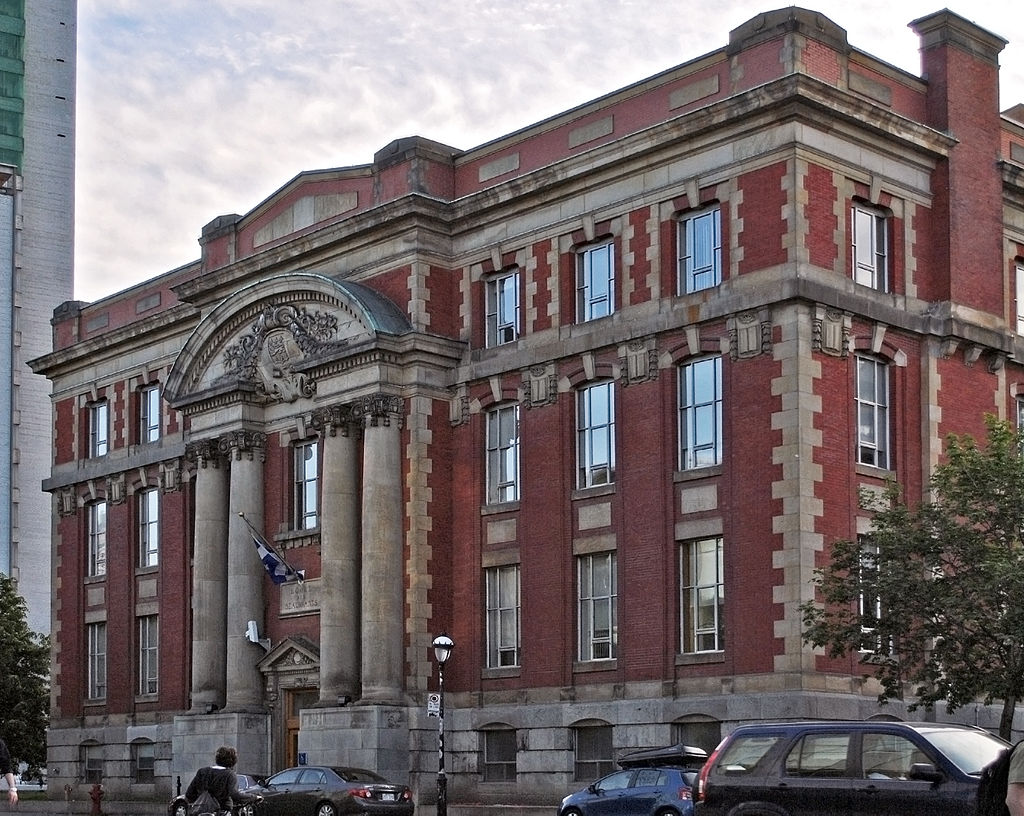Browse "Organizations & Movements"
-
Article
L' Action nationale
L'Action nationale was founded in 1933 by economist Esdras Minville as the voice of the Ligue d'Action nationale. It is the oldest journal of intellectual opinion writing in Quebec.
"https://d2ttikhf7xbzbs.cloudfront.net/media/media/6e559a82-fa39-4e67-8505-cd188e83d9d0.jpg" // resources/views/front/categories/view.blade.php
https://d2ttikhf7xbzbs.cloudfront.net/media/media/6e559a82-fa39-4e67-8505-cd188e83d9d0.jpg
-
Article
L'Arche
L’Arche is a not-for-profit social service agency that creates and runs supportive communities for people with intellectual disabilities. Founded in 1964, L’Arche builds communities where people with and without intellectual disabilities work, play, live and learn together. L’Arche Canada is part of the International Federation of L’Arche Communities. L’Arche International operates 153 communities worldwide in 38 countries. The organization has over 10,000 members with and without intellectual disabilities worldwide. In Canada, L’Arche operates 31 communities in nine provinces as of 2020.
"https://d2ttikhf7xbzbs.cloudfront.net/media/new_article_images/L'Arche_screenshot.png" // resources/views/front/categories/view.blade.php
https://d2ttikhf7xbzbs.cloudfront.net/media/new_article_images/L'Arche_screenshot.png
-
Article
Lobbying in Canada
Lobbying is the process through which individuals and groups articulate their interests to federal, provincial or municipal governments to influence public policy or government decision-making. Lobbyists may be paid third parties who communicate on behalf of their clients; or they may be employees of a corporation or organization seeking to influence the government. Because of the possibility for conflict of interest, lobbying is the subject of much public scrutiny. At the federal level, lobbying activities are governed by the Lobbying Act. Provinces and municipalities have their own lobbying laws and by-laws.
"https://d2ttikhf7xbzbs.cloudfront.net/media/media/11551bec-a5f6-4e78-b101-265ddf7610cb.jpg" // resources/views/front/categories/view.blade.php
https://d2ttikhf7xbzbs.cloudfront.net/media/media/11551bec-a5f6-4e78-b101-265ddf7610cb.jpg
-
Article
Madawaska: A Canadian-American Borderland, from Colonization to Division
Madawaska was a borderland that comprised parts of New Brunswick, Lower Canada, and the state of Maine, concentrated along the upper Saint John River valley.
"https://d2ttikhf7xbzbs.cloudfront.net/media/media/0052e055-bf0b-4980-8f10-08f926f15b9b.jpg" // resources/views/front/categories/view.blade.php
https://d2ttikhf7xbzbs.cloudfront.net/media/media/0052e055-bf0b-4980-8f10-08f926f15b9b.jpg
-
Article
#MeToo Movement in Canada
The #MeToo movement protesting sexual violence against women began in the United States in October 2017 in the wake of accusations against Hollywood film producer Harvey Weinstein. Since then, it has rapidly expanded internationally through Facebook, Twitter and other social media platforms. In Canada, #MeToo and its French equivalent, #MoiAussi, have amplified the voices of victims and changed the conversation pertaining to rape, sexual abuse, sexual assault and other forms of sexual violence, harassment and misconduct.
"https://d2ttikhf7xbzbs.cloudfront.net/media/new_article_images/metoo/dreamstime_xl_114828812.jpg" // resources/views/front/categories/view.blade.php
https://d2ttikhf7xbzbs.cloudfront.net/media/new_article_images/metoo/dreamstime_xl_114828812.jpg
-
Article
Muscular Dystrophy Canada
Muscular Dystrophy Canada (MDC) was founded in 1954 by a group of parents who had children with Duchenne muscular dystrophy. Now a national voluntary health organization with offices across Canada, MDC is dedicated to fighting over 40 different neuromuscular disorders.
"https://development.thecanadianencyclopedia.ca/images/tce_placeholder.jpg?v=e9dca980c9bdb3aa11e832e7ea94f5d9" // resources/views/front/categories/view.blade.php
https://development.thecanadianencyclopedia.ca/images/tce_placeholder.jpg?v=e9dca980c9bdb3aa11e832e7ea94f5d9
-
Article
National Action Committee on the Status of Women
The National Action Committee on the Status of Women (NAC) is a feminist, activist organization that was founded in 1971 to pressure the Canadian government to implement the recommendations of the Report of the Royal Commission on the Status of Women in Canada. The NAC ceased active operations in the late 2000s.
"https://d2ttikhf7xbzbs.cloudfront.net/media/media/be832524-f521-4200-b242-3c702ae0f3c4.jpg" // resources/views/front/categories/view.blade.php
https://d2ttikhf7xbzbs.cloudfront.net/media/media/be832524-f521-4200-b242-3c702ae0f3c4.jpg
-
Article
National Order of Québec (Ordre national du Québec)
The National Order of Québec (Ordre national du Québec) was instituted 20 June 1984.
"https://development.thecanadianencyclopedia.ca/images/tce_placeholder.jpg?v=e9dca980c9bdb3aa11e832e7ea94f5d9" // resources/views/front/categories/view.blade.php
https://development.thecanadianencyclopedia.ca/images/tce_placeholder.jpg?v=e9dca980c9bdb3aa11e832e7ea94f5d9
-
Article
Francophone Nationalism in Québec
Francophone nationalism in Québec or Québec nationalism is the result of the evolution of French-Canadian nationalism.
"https://d2ttikhf7xbzbs.cloudfront.net/media/media/69946f3c-6a50-4516-a665-8c412faf420d.jpg" // resources/views/front/categories/view.blade.php
https://d2ttikhf7xbzbs.cloudfront.net/media/media/69946f3c-6a50-4516-a665-8c412faf420d.jpg
-
Article
Native Women’s Association of Canada
Founded in 1974, the Native Women’s Association of Canada (NWAC) is an organization that supports the socio-economic, political and cultural well-being of Indigenous women in Canada. Dedicated to the principles of humanitarianism, NWAC challenges the inequalities and discrimination that Indigenous women face by remaining politically engaged in causes such as education, housing, child welfare and more.
"https://d2ttikhf7xbzbs.cloudfront.net/media/media/936c2b99-17d5-42ab-84f2-a309bc3022c9.jpg" // resources/views/front/categories/view.blade.php
https://d2ttikhf7xbzbs.cloudfront.net/media/media/936c2b99-17d5-42ab-84f2-a309bc3022c9.jpg
-
Article
Nine Hour Movement
The Nine Hour Movement was an international phenomenon, taking place in Canada between January and June 1872. The movement’s goal was to standardize shorter working days. Though this particular mandate was unsuccessful, the movement did have an impact, including setting the foundation for the Canadian Labor Union.
"https://d2ttikhf7xbzbs.cloudfront.net/media/media/74917b1f-8a36-49c3-99fd-4cf328a0bfa3.jpg" // resources/views/front/categories/view.blade.php
https://d2ttikhf7xbzbs.cloudfront.net/media/media/74917b1f-8a36-49c3-99fd-4cf328a0bfa3.jpg
-
Article
October Crisis (Plain-Language Summary)
The October Crisis happened in the fall of 1970. It was sparked by the Front de liberation du Québec (FLQ). The FLQ used terrorist tactics to try and make Quebec independent from Canada. On 5 October, the FLQ kidnapped James Cross, a British trade commissioner. The FLQ also kidnapped Quebec cabinet minister Pierre Laporte. Prime Minister Pierre Trudeau invoked the War Measures Act. The Act had never been used before during peacetime. It suspended civil liberties and led to hundreds of arrests. Laporte was murdered and found on 17 October. Cross was freed on 3 December. The crisis ended on 28 December, when Laporte’s killers were captured. (This article is a plain-language summary of the October Crisis. If you are interested in reading about this topic in more depth, please see the full-length entry.)
"https://d2ttikhf7xbzbs.cloudfront.net/media/new_article_images/PA-129838-curious-children.jpg" // resources/views/front/categories/view.blade.php
https://d2ttikhf7xbzbs.cloudfront.net/media/new_article_images/PA-129838-curious-children.jpg
-
Article
Office québécois de la langue française
Created in 1961, the Office québécois de la langue française is a Québec public institution responsible for linguistic officialization, terminological recommendations and the francization of the language of work in both the public and the private sectors. Since 1977, it has been responsible for ensuring that the Charte de la langue française is complied with in Québec, and for monitoring the province’s language situation.
"https://d2ttikhf7xbzbs.cloudfront.net/media/media/f1415842-0d04-4cea-b4a4-e8f7820fc5a9.jpg" // resources/views/front/categories/view.blade.php
https://d2ttikhf7xbzbs.cloudfront.net/media/media/f1415842-0d04-4cea-b4a4-e8f7820fc5a9.jpg
-
Article
One Big Union
The One Big Union (OBU) was a radical labour union formed in Western Canada in 1919. It aimed to empower workers through mass organization along industrial lines. The OBU met fierce opposition from other parts of the labour movement, the federal government, employers and the press. Nevertheless, it helped transform the role of unions in Canada. Click here for definitions of key terms used in this article.
"https://d2ttikhf7xbzbs.cloudfront.net/media/new_article_images/OneBigUnion/OBU_logo.JPG" // resources/views/front/categories/view.blade.php
https://d2ttikhf7xbzbs.cloudfront.net/media/new_article_images/OneBigUnion/OBU_logo.JPG -
Article
Opus Dei
Opus Dei is an institution of the Roman Catholic Church. It was founded in 1928 by the Spanish priest Josemaria Escrivcriva, who preached that lay people can and should seek holiness in their work and everyday lives.
"https://development.thecanadianencyclopedia.ca/images/tce_placeholder.jpg?v=e9dca980c9bdb3aa11e832e7ea94f5d9" // resources/views/front/categories/view.blade.php
https://development.thecanadianencyclopedia.ca/images/tce_placeholder.jpg?v=e9dca980c9bdb3aa11e832e7ea94f5d9

